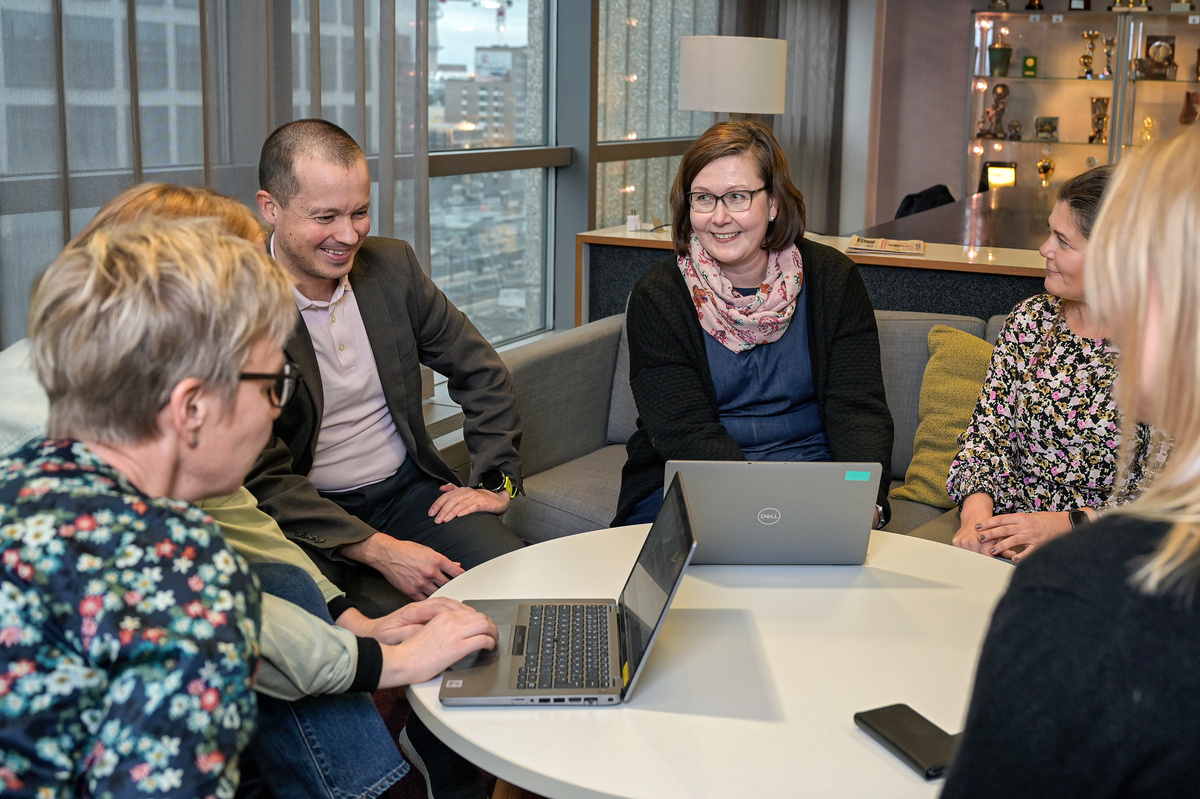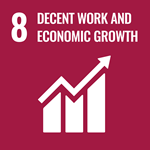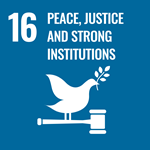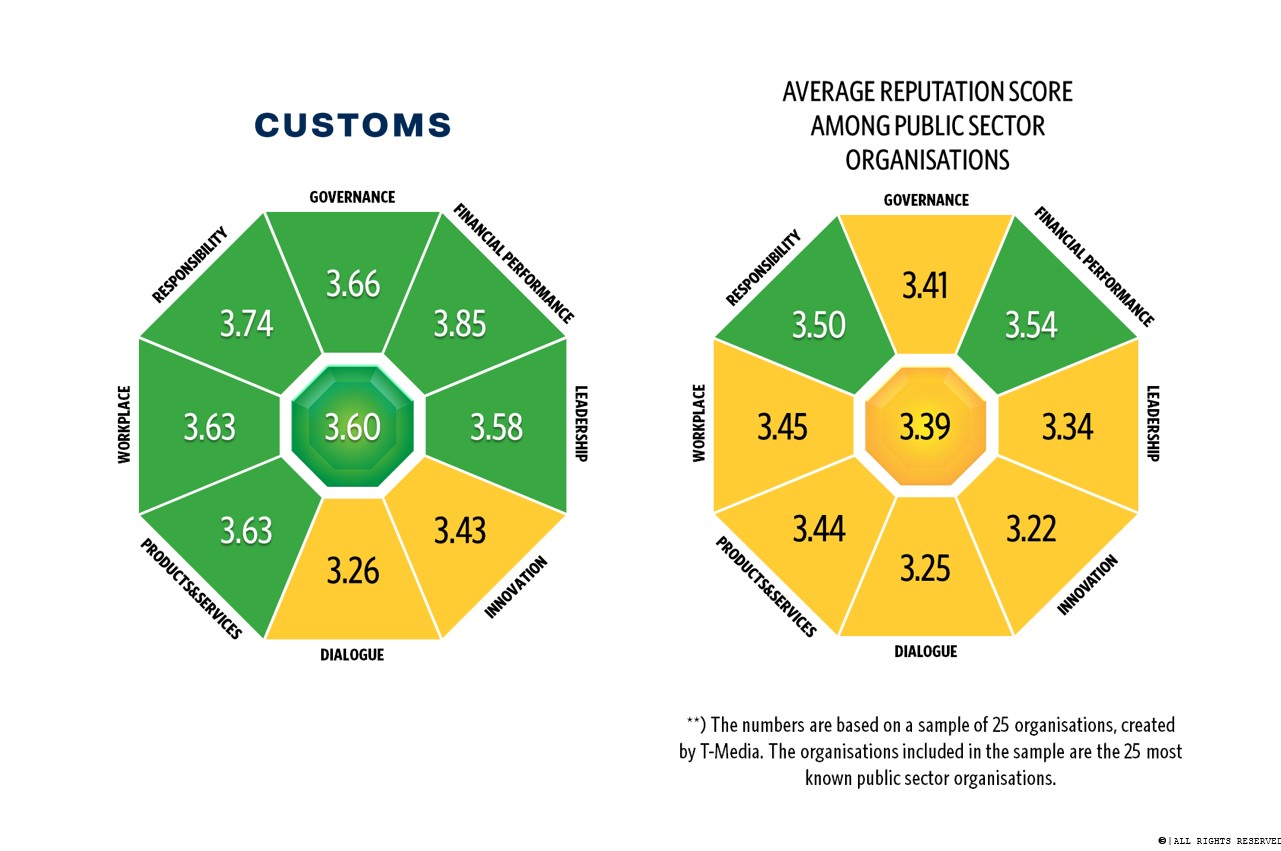The values and ethical principles of Finnish Customs guide our actions. We carry out our duties sustainably and effectively in a multicultural operating environment, taking advantage of opportunities and preparing for threats. Trust is a key objective of open central government work. We use the annual Reputation&Trust survey to track the development of Finnish Customs’ reputation.
We value diversity and in our recruitment, we encourage people from different backgrounds to apply for jobs at Customs. This is highlighted in our job advertisements, in which we seek applicants of different ages and genders as well as people belonging to linguistic, cultural or other minorities.
We train our personnel to interact with people from different backgrounds and strengthen their knowledge of equality and equity to ensure non-discrimination in service situations.
We engage in proactive cooperation with educational institutions, offer internships and are actively visible at trade fairs and in the media. In this way, we contribute to the development of the skills needed in working life and raise awareness of potential jobs while people are studying.
We encourage employees of Finnish Customs to enhance their daily work and customs services through employee engagement, initiative activities and the strengthening of development skills.
Our sustainability efforts
We use the annual Reputation&Trust survey to track the development of Finnish Customs’ reputation. The survey assesses Customs’ reputation in terms of governance, financial performance, leadership, innovations and dialogue. The overall reputation score is based on the scores in all the topics.
In 2024, our overall reputation score was 3.60 (2023: 3.67). Despite a slight decline, our score remains good. Among all public administration organisations participating in the survey, we ranked 13th, the same as last year.
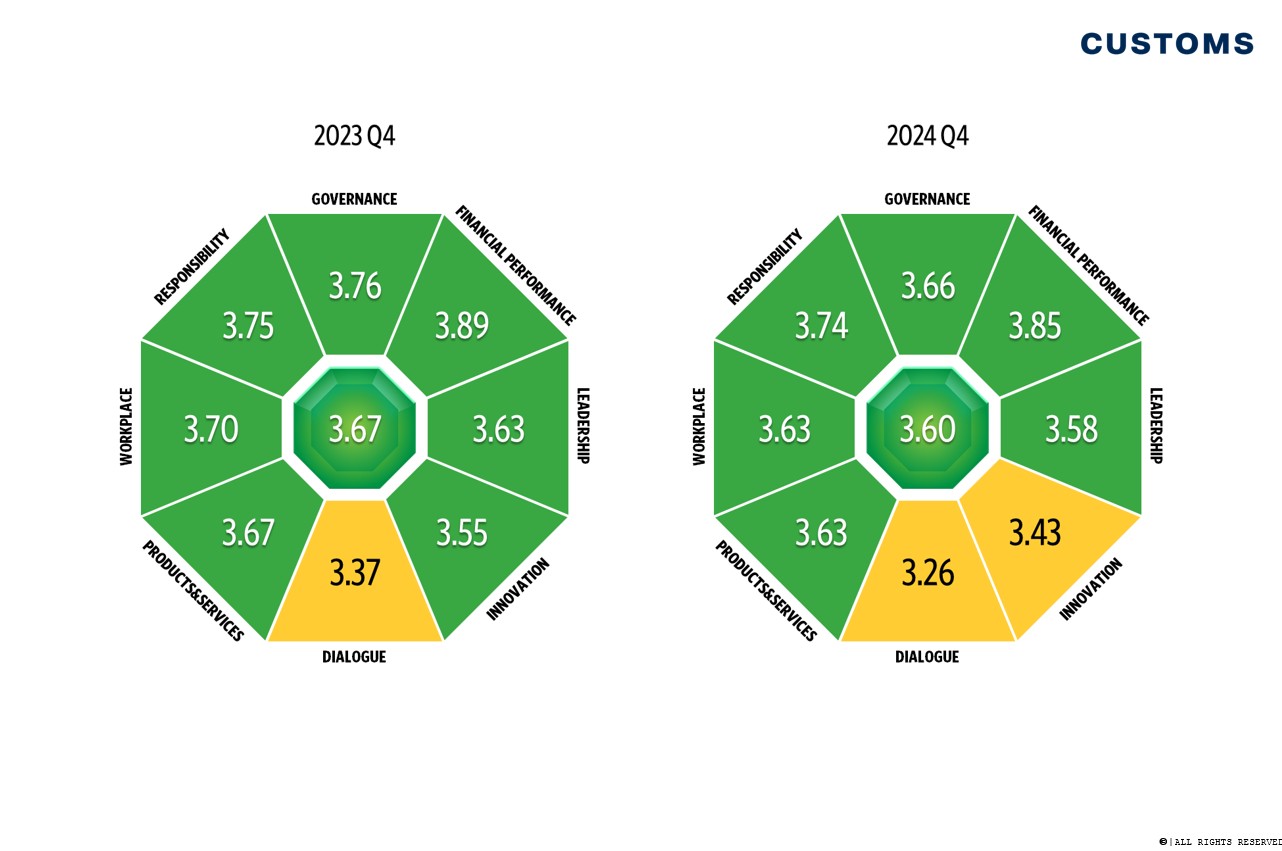
Our reputation affects how citizens act, such as whether they want to support Customs with their tax money, apply for jobs with us, listen to what we have to say and support us in times of crisis. Some aspects of reputation influence behaviour more than others, and research provides us with important information about where we should focus our efforts.
Despite a slight decline in overall reputation, the trust of citizens in Customs and favourable attitudes towards us have remained at the same level as in previous years. Trust and support in times of crisis in particular have developed positively since last year.
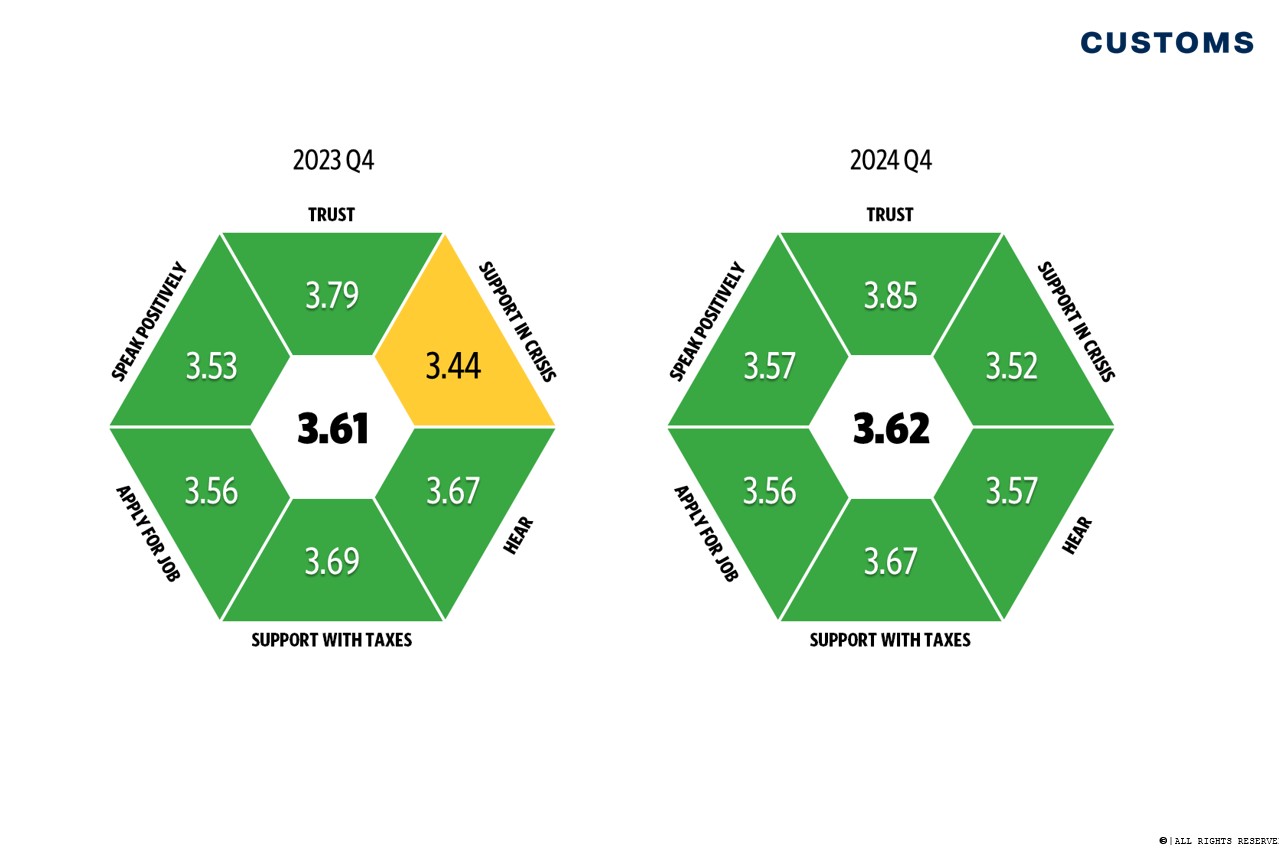
Finnish Customs is seen as a versatile authority among our stakeholders. To reinforce this image, we actively share information about Customs at various events and through cooperation with educational institutions, among other things.
We meet citizens at events
Finnish Customs actively participates in events organised all around Finland. At these events, we meet citizens of all ages, and the residents of the event locations in particular have an opportunity to talk to the local Customs personnel. We highlight Customs in line with the theme of the event, focusing on aspects such as security and control. In addition, vocational schools and colleges organise career days where our employees talk about their work and career paths. Many people have been interested and wanted to talk about Finnish Customs as a place to work as well as apprenticeship training at Customs, bringing up topics such as how to apply for training, when the training begins and what it is like to study to become a customs professional.
Young people learn about the activities of Finnish Customs through visits to educational institutions
We visit educational institutions and organise visits to our premises for comprehensive school, general upper secondary school, vocational school and college groups. During these visits, Customs personnel have talked about their jobs, their career paths, what Customs does and why smooth goods traffic and monitoring it are important. Customs control and Finnish Customs as a workplace in particular have been recurring topics of interest. Visits to educational institutions are one of the most important ways for us to reach young people all around Finland. After the coronavirus pandemic, the number of requests for visits has gradually increased, and last year there were nearly 50 visits.
Education about customs in higher education institutions
Finnish Customs has continued cooperation at different levels with many educational institutions, including higher education institutions. We have taught the basics of import and export and explained the role and importance of Customs in international trade at Lappeenranta-Lahti University of Technology LUT and Turku University of Applied Sciences (Turku UAS). In autumn 2024, 70 students participated in a unit on customs matters worth five credits as a part of a study module on transport and forwarding at Turku UAS. Customs-related study modules at higher education institutions increase awareness about customs and create a positive image of Finnish Customs as a potential employer for experts graduating in the coming years.
Through cooperation with educational institutions, we can demonstrate that we are committed to open and transparent operations and that we have skilled and approachable experts. This reinforces our reputation as a sustainable, reliable and innovative employer. Finnish Customs engages in various forms of cooperation in connection with training with different parties, examples of which are provided below.
Further vocational qualification in customs prepares people for a wide range of tasks
People working in tasks related to customs clearance can complete a further vocational qualification in customs organised by Omnia and Finnish Customs in cooperation (press release in Finnish). A total of 39 students participated in the studies for the qualification in 2024. The qualification ensures the ability to work in customs clearance, forwarding or vessel clearance tasks in companies engaged in foreign trade.
In certain duties at Customs, it is possible to complete a further vocational qualification in customs through an apprenticeship. In apprenticeship training (page in Finnish), most of the skills are acquired through practical work tasks at the workplace. At Customs, this is organised by assigning the students a workplace instructor and a mentor to guide their studies and teach them the skills required for the qualification.
On-the-job training is also supported by Kouvola Vocational Institute Eduko, which provides the qualification, Finnish Customs’ training services and the students’ supervisors. Learning objectives, topics, reporting and assessment are recorded in the on-the-job training diary. In 2024, 38 students completed the further vocational qualification in customs at Finnish Customs and 23 students began their studies.
Strengthening customs expertise through cooperation between authorities
Close domestic cooperation in connection with training has been carried out between the PCB partners, that is, the police, Finnish Customs, the Finnish Border Guard and the Finnish Security and Intelligence Service. Joint training for authorities has been aimed at strengthening expertise in key areas of activity in order to support the security of society.
International customs training cooperation focused on cooperation with the EU and the Nordic countries.
Customer and stakeholder training via webinars
In 2024, we organised webinars for the customers of Finnish Customs, which attracted a total of 697 participants. Webinars have proven to be an effective way to reach and educate large target groups. The topics covered in the webinars included providing value information and using the Customs Clearance Service in import customs declarations. We also organised one webinar in English and Swedish.
We organised a total of 31 other customer and stakeholder training sessions during 2024. They allowed us to reach nearly 900 employees from various organisations. As a rule, we visited companies to provide training on the basics of customs clearance.
Initiatives strengthen Finnish Customs and give every Customs employee the opportunity to influence everyday tools and processes. Customs employees can submit initiatives via the initiative channel, and the best ideas are selected for testing and implementation. This form of collective intelligence makes Customs more dynamic and makes it possible for everyone at all levels of the organisation to have an impact.
A total of 26 initiatives were submitted to Customs’ initiative channel in 2024. Four of the initiatives were approved directly and 12 were recorded for possible implementation in different kinds of projects. As expected, the number of initiatives decreased from the previous period's 93 initiatives, because the 2023 period was the channel’s first period of operation and people had been storing many ideas in their desk drawers. As in the previous year, the best initiative was selected and subsequently presented to and approved by Customs' management team.
The winner in 2024 was a development initiative for the Fintaric service, which aims to improve the search feature in the service. Fintaric is a public service where you can browse commodity codes for goods and related information, such as import duties and import and export restrictions. The initiative proposed that, among other things, information such as restrictions on goods and document codes related to preferential treatment should be displayed in Fintaric in the future. This change would make the work of both customers and customs officials significantly easier. The initiator received EUR 400 and the Aloitteentekijä 2024 (Initiator 2024) diploma.
In the fall of 2023, asylum seekers arrived in the country by bicycle via border crossing points on the eastern border. Border crossings must always be made by vehicle; it is not possible to cross the border on foot. Because the people entering the country did not clear their bicycles through customs but abandoned them at the border crossing points, the bicycles were considered to have been surrendered to the State.
During 2024, we organised several auctions in Vaalimaa, Salla, Lentiira (Vartius), Hamina and Lappeenranta, where the bicycles were sold. Most of the bicycles were brand new, and the few that were in poor condition were immediately taken to be recycled. Roughly 900 bicycles were auctioned (press release in Finnish). The auctions attracted large crowds to the border crossing points, and almost all of the bicycles were sold. The proceeds from the auctions were paid to the State. The State earned a total of EUR 42,491 in revenue from the bicycles.
